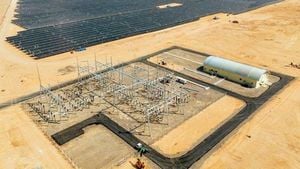The National Stock Exchange of India (NSE) is gearing up for its much-anticipated initial public offering (IPO) in 2025, marking a significant milestone in India's financial landscape. With a face value set at ₹1 per equity share, the IPO is expected to attract substantial investor interest.
The price band for the NSE IPO is yet to be officially announced, but estimates suggest it will range from ₹[.] to ₹[.] per share. The total issue size is projected to be approximately ₹[.] crores, which includes a fresh issue of about ₹[.] crores and an offer for sale of approximately [.] equity shares. The IPO will be a book-built issue, listed on the Bombay Stock Exchange (BSE).
In terms of investor allocation, the IPO will have a retail quota of not more than 35%, a Qualified Institutional Buyer (QIB) quota of up to 50%, and a Non-Institutional Investor (NII) quota capped at 15%. Retail investors will have the opportunity to apply for a minimum market lot of [.] shares, with an application amount of ₹[.]. They can apply for up to 13 lots, which allows for a maximum investment of ₹[.].
The IPO is slated to open and close in 2025, with the allotment finalized on a date yet to be announced, and the listing expected shortly thereafter. The NSE, established in 1992 and recognized as a stock exchange by SEBI in April 1993, has been instrumental in shaping India's financial markets.
In recent years, the NSE has witnessed remarkable growth, with the total market capitalization of its listed companies increasing by 7% from ₹384 trillion in FY24 to ₹411 trillion in FY25. The number of unique investors has surged to 11.3 crore, up from 9.2 crore in the previous financial year, reflecting a growing interest in stock market investments.
Uttar Pradesh has emerged as the leading state for new investor registrations, adding 29.5 lakh new investors in FY25, which accounts for 14% of the total new additions. Following closely are Maharashtra and Gujarat, with 26.2 lakh and 17.2 lakh new registrations, respectively. Notably, Delhi-NCR leads among districts with 12.2 lakh new registrations, while Mumbai and Bengaluru follow with 8.5 lakh and [.] respectively.
The NSE is not only a critical player in the equity market but also boasts one of the largest derivatives markets globally, trading options and futures on various securities. Its robust technological framework ensures safety and resilience, making it a reliable platform for all types of investors.
As the IPO approaches, the NSE's financial performance is under scrutiny. The company reported a revenue of ₹[.] crores in 2024, up from ₹[.] crores in 2023. Profit figures also reflect growth, with ₹[.] crores reported in 2024 compared to ₹[.] crores the previous year. Key financial metrics include a return on equity (ROE) of [.]%, a return on capital employed (ROCE) of [.]%, and an earnings per share (EPS) of ₹[.] (Basic).
Peer comparisons show that while the NSE stands strong, it operates in a competitive environment. The market capitalization of NSE Emerge, which lists small and medium enterprises (SMEs), reached ₹1.8 lakh crore as of March 31, 2025. SMEs have become a focal point of growth, with 163 of the 242 IPOs launched in FY25 being from this segment, raising a total of ₹7,111 crores.
Investors have shown a keen appetite for SME IPOs, with average listing gains soaring from just 2% in 2019 to an impressive 74% in 2024. The highest fundraising among SMEs was achieved by Danish Power Ltd, which raised ₹198 crores, while Hoac Foods India Ltd raised the least at ₹6 crores. The average fundraising per SME IPO stands at ₹44 crores.
Given the increasing participation of retail investors and the heightened oversubscription in recent IPOs, the Securities and Exchange Board of India (SEBI) has undertaken a comprehensive study to analyze investor behavior in IPOs. This study covered data from 144 IPOs listed between April 2021 and December 2023, revealing insights into how returns on shares influence investor selling behavior.
As the NSE prepares for its IPO, the excitement among investors is palpable. The upcoming listing is anticipated to further bolster the NSE's reputation as a key player in the Indian financial market. With a strong foundation and a commitment to high standards of corporate governance, the NSE is poised to attract a diverse range of investors, from retail to institutional.
In conclusion, the NSE's IPO represents not just a financial event but a reflection of the growing confidence in India's economic prospects. As more investors flock to the market, the NSE's role in facilitating investment opportunities will undoubtedly expand, contributing to the overall growth of the Indian economy.






